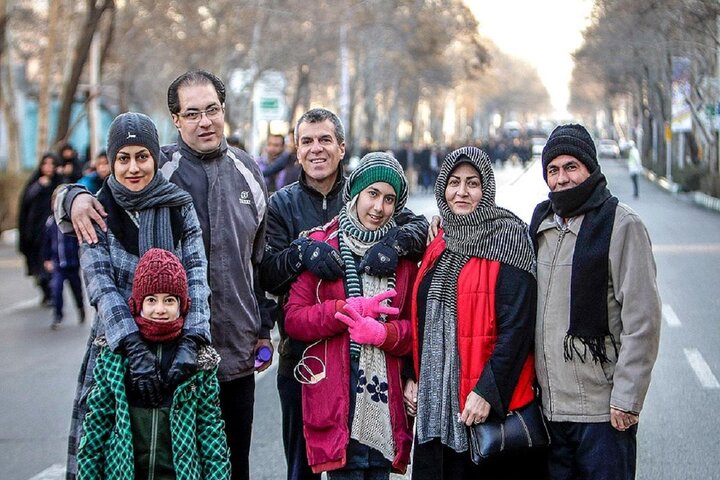Father’s Day in Iran serves as a tribute to the fathers' sacrifices and promotes values of respect, love, and family unity inspired by Imam Ali’s exemplary fatherhood.

The importance of a father’s role in Islam and Iranian culture
In Islamic and Iranian culture, fathers hold an exceptionally significant position, recognized as the pillar of the family and a symbol of stability, effort, and sacrifice. In Islamic teachings, respecting parents is one of the most critical duties of children, and God repeatedly emphasizes this in the Holy Quran.
In verse 23 of Surah Al-Isra, it is stated: “For your Lord has decreed that you worship none but Him. And honour your parents. If one or both of them reach old age in your care, never say to them ˹even˺ ‘ugh,’ nor yell at them. Rather, address them respectfully,” underscoring the importance of honoring and being good to one’s parents.

Similarly, in Iranian culture, fathers are revered as symbols of authority, wisdom, and family support. From ancient times, the father’s role in family and society has been established as the central axis of familial and social relations. This perspective is well reflected in Iranian poetry and literature, highlighting the father’s pivotal role. Renowned poets like Ferdowsi, Saadi, and Hafez have alluded to the respect and significant role of fathers in their works, and this theme is also evident in Iranian tales and folklore.
Throughout Iranian history, fathers have not only played familial roles but have also been vital in social and cultural contexts. Many fathers have contributed as educators, scholars, artists, and leaders in transmitting knowledge and human values. This cultural and historical importance has made fathers in each generation be recognized as moral and practical role models.
In Iran, Father’s Day coincides with the birth anniversary of Imam Ali (AS), the first Shia Imam and an embodiment of justice, courage, and compassionate fatherhood. This choice stems from Imam Ali’s (AS) distinguished personality and his role as an exemplary father in Islamic history. He was not only a religious leader but also a loving and nurturing father, making him an unparalleled model for Muslims.

Father’s Day in Iran is an opportunity to honor and appreciate fathers’ efforts and sacrifices. It also serves as a reminder of fathers’ critical responsibilities in raising children, supporting the family, and serving as guides and mentors. Families celebrate this day by holding simple ceremonies or giving small gifts to fathers, expressing their love and respect.
Choosing Imam Ali’s (AS) birthday as Father’s Day is not only of religious significance but also a symbol of the integration of cultural and religious values in Iran. Imam Ali (AS), in all aspects of his life, serves as a comprehensive model for Muslims, and his fatherly role is no exception. Historical and religious sources recount numerous stories of his affectionate behavior towards his children and his guidance to them, reflecting the importance of fatherhood in Islam.
Imam Ali (AS): A perfect example of fatherhood in Islam
Imam Ali (AS) is a multidimensional and complete personality, serving as a model for all Muslims and even non-Muslims. As a father, he combined love and Islamic upbringing with decisiveness and justice. His behavior with his children, especially with Imam Hassan (AS), Imam Hussein (AS), and Hazrat Zainab (SA), exemplifies love, respect, and Islamic upbringing.
One of the vital lessons from Imam Ali (AS) as a father is the emphasis on religious and moral education for children. He consistently advised his children to adopt piety and walk the path of truth and justice. His wise words, recorded in his letters and sermons in Nahjul Balagha, vividly illustrate his concern for the proper upbringing of his children and future generations.

For instance, Imam Ali’s (AS) letter to Imam Hassan (AS), known as Letter 31 of Nahjul Balagha, is filled with invaluable advice on piety, ethics, and life conduct. This letter is considered one of the significant educational documents in Islamic culture and demonstrates Imam Ali’s (AS) profound perspective on the responsibilities of fatherhood.
Imam Ali (AS) also emphasized practical education and leading by example in raising his children. He was a role model for his children not only in his words but also in his deeds. The values of courage, justice, and support for the oppressed were characteristics that Imam Ali (AS) instilled in his children, values that continued through subsequent generations.
The role of Father’s Day in promoting family values
Father’s Day in Iran is an opportunity to reflect on fathers’ roles and responsibilities within the family and society. This day reminds families that appreciation for fathers’ efforts should not be confined to a single day but should be continuous. Additionally, this occasion can serve as an excellent opportunity to strengthen family bonds.

Another positive aspect of this day is teaching values such as respect, love, and empathy to younger generations. Children and adolescents, by observing the appreciation and respect shown to fathers, internalize these values in their lives and, in the future, as parents or members of society, pass these values on to the next generation.
Father’s Day in Iran is not only a day to celebrate fathers but also an opportunity to remind society of the crucial role fathers play in families and communities. This day, intertwined with Imam Ali’s (AS) birthday, reflects the high Islamic and Iranian values regarding fatherhood. By emulating Imam Ali’s (AS) character, the father’s position within the family can be strengthened, highlighting his role in nurturing a responsible and ethical generation.
Ultimately, Father’s Day is a time to reflect on familial values and responsibilities. This occasion can provide a foundation for spreading a culture of gratitude and respect in society, emphasizing fathers’ vital role, and taking steps toward strengthening the family as the primary social institution.
Reported by Mohaddeseh Pakravan

























Your Comment